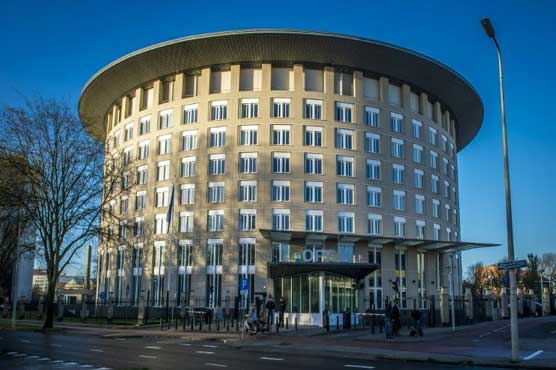West accuses Russia of global hacking conspiracy

The US has indicted seven alleged Russian members of the GRU military intelligence agency.
THE HAGUE (AFP) - Western powers accused Russia on Thursday of orchestrating a string of global cyber-attacks including an audacious plot to hack the world’s chemical weapons watchdog in The Netherlands.
The United States indicted seven alleged Russian members of the GRU military intelligence agency over attacks on targets including the Hague-based OPCW, the US Democratic party, world sports bodies and US nuclear energy company Westinghouse.
The charges came as part of a joint crackdown by Britain, The Netherlands, Canada and the United States against a string of hacking attempts by what London called "pariah state" Russia.
Russia scathingly accused the West of "spy mania", while Russian President Vladimir Putin has repeatedly and angrily rejected similar charges.
In scenes reminiscent of a Cold War spy novel, Dutch security services said they had expelled four Russian GRU agents in April after they attempted a cyber-attack on the Organisation for the Prohibition of Chemical Weapons, from a car parked in a nearby hotel.
The OPCW was at the time probing the nerve agent poisoning of Russian ex-spy Sergei Skripal in the English town of Salisbury, and an alleged chemical attack on the Syrian town of Douma by the Moscow-backed regime in Damascus.
The Dutch and British prime ministers Mark Rutte and Theresa May in a joint statement accused the GRU of "disregard for global values" and lashed out at the Russian agency’s "unacceptable cyber activities".
‘Unacceptable cyber activities’
The Russians were tracked from their arrival in Amsterdam on diplomatic passports in April, and then seen hiring a Citroen car which they parked outside the Marriott hotel next to the OPCW.
When Dutch agents swooped on April 13 they found electronic equipment in the boot of the car to intercept the OPCW’s wifi and log in codes, including an antenna hidden in the back of the car and facing the chemical weapons watchdog.
Investigations found the Russians had originally taken a taxi from GRU barracks in Moscow to the airport, for which Dutch agents later found a receipt from their hotel. Some of their mobile phones were also activated in Moscow near the agency’s headquarters.
"They were clearly not here on holiday," said the head of the Dutch MIVD intelligence service, Major-General Onno Eichelsheim.
A laptop belonging to one of the four was linked to Brazil, Switzerland and Malaysia -- while the activities in Malaysia were related to the investigation into the 2014 shooting down of flight MH17 over Ukraine.
It also revealed that the agents had also made searches for the OPCW-affiliated Spiez laboratory in Switzerland - which the Swiss last month said had been targeted by Russia.
Dutch authorities released the Russian diplomatic passports of the four men identifying them as Oleg Sotnikov, Alexei Morenets, Alexei Minin and Yevgeny Serebryakov. They also showed photos of the men outside the hotel.
The OPCW confirmed it had suffered "increased cyber-related activities" since the beginning of the year and had "undertaken measures to mitigate them."
"The OPCW takes very seriously the security of its information systems and networks," it said.
‘Pariah state’
The four Russians allegedly involved in the OPCW attack were included in the list of seven men indicted by the US Justice Department.
John Demers, US Assistant Attorney General for National Security, confirmed that known attack targets included the OPCW, sports bodies including FIFA and the World Anti-doping Agency (WADA) and Westinghouse.
Demers said the operations - dating back to 2014 - "involved sophisticated, persistent and unauthorized access into the victims’ computer networks for the purpose of stealing private or otherwise sensitive information."
The West appeared to have made a coordinated response to the alleged Russian hacking, with NATO chief Jens Stoltenberg separately warning Russia to halt its "reckless" behaviour and the European Union condemning "aggressive" Russian spying.
Canada confirmed Thursday it believes itself to have been targeted by Russian cyber-attacks, citing breaches at its centre for ethics in sports and at the Montreal-based World Anti-Doping Agency (WADA).
Britain and Australia had just hours earlier pointed the blame directly at alleged GRU front operations such as Fancy Bear and APT 28 for a string of worldwide attacks.
British Defence Secretary Gavin Williamson said that these were "not the actions of a great power, this is the actions of a pariah state".
British government sources said they had has assessed with "high confidence" that the GRU was "almost certainly" behind the Democratic Party hack that some Hillary Clinton supporters claimed helped tip the US election in Donald Trump’s favour, as well as the WADA attack which resulted in the release of the medical files of global sports stars including tennis’s Serena and Venus Williams and British cyclist Bradley Wiggins.
Russia’s foreign ministry spokeswoman Maria Zakharova said that the allegations had been mixed together "indiscriminately".
"That’s a hell of a mix for a perfume," she told reporters.
London has accused two of GRU’s officers of poisoning former double-agent Skripal and his daughter Yulia in Salisbury in March, using a perfume bottle containing the powerful nerve agent Novichok.
A Russian foreign ministry representative told AFP separately: "Western spy mania is gathering pace."
GRU stands for the Main Intelligence Directorate, Russia’s military intelligence agency which is one of Moscow’s three spy agencies along with the FSB security service and the SVR foreign intelligence agency.

